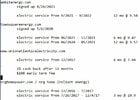The 2022 Massachusetts Climate Bill (signed by Charlie Baker) had the requirement that the utilities start to offer off-peak electric rates for EV charging. It’s been a year and a half since that passed.
Anyone know if there are any updates on progress implementing this?
What to know about the new Mass. climate law
Anyone know if there are any updates on progress implementing this?
The law also requires electric utilities to establish off-peak rates for EV charging — meaning you’d pay less for electricity you used to charge your car when demand is low.
What to know about the new Mass. climate law



